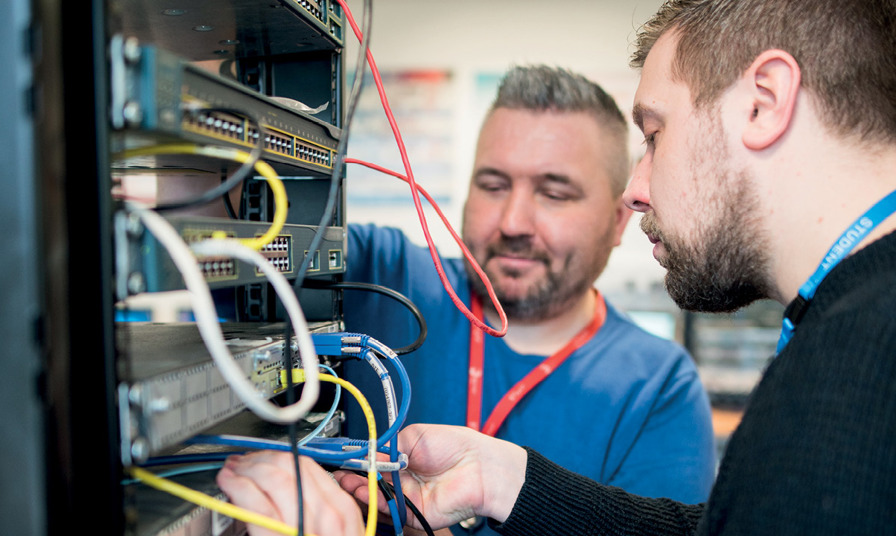Entry Requirements
A minimum of 80 UCAS Tariff points. In addition, you will be required to have a GCSE (or an equivalent level 2 qualification) at grade 4 (formerly grade C) or above in English and mathematics.
Study Mode
Full time
Duration
3 years
Timetable
Check with your tutor
Key Features & Benefits
- Small class sizes, more one-to-one tutor support and accessible resources
- Learn from tutors who have a wealth of industry knowledge and experience
- State-of-the-art Cyber Suite – study in bespoke digital suites with the latest in technology
- Unrivalled support – from Academic Coaches to Careers Advice and Disability Support
- Validated by UK Top 15 Lancaster University
- Subject to validation
-
Overview
Our Networking and Cyber Security BSc (Hons) degree is built for the future. It is designed to give you the technical expertise and real-world experience needed to secure, maintain, and manage the networks that underpin today’s connected world.
You’ll learn how to protect critical infrastructure from cyber threats, prevent unauthorised access, and ensure data integrity across enterprise systems. From firewalls and VPNs to intrusion detection and secure routing, you’ll develop the knowledge and confidence to operate at the front line of digital defence.
Train in our state-of-the-art Cyber Suite
Put theory into practice in our dedicated Cyber Security Suite, where you’ll use industry-standard tools to simulate and defend against real-world cyber attacks. This purpose-built environment allows you to test and strengthen your technical skills in a secure, hands-on setting.
Master the Network with Cisco Technology.
This course is built around Cisco-certified networking technologies, giving you experience with one of the world’s most recognised platforms. You’ll explore key areas such as: network design and implementation; routing and switching; secure network access; threat detection and mitigation; wireless and cloud-based networking. By following the Cisco Networking Academy curriculum, you’ll be prepared to pursue industry-recognised certifications alongside your degree – boosting your employability even further.
Project management for cyber professionals
In your final year, you’ll complete a Project Management module focused on delivering secure technical solutions. You’ll explore both agile and traditional methods, learn how to manage risk in security-sensitive environments, and gain valuable experience in team leadership and stakeholder communication – essential for today’s tech professionals.
Graduate with in-demand skills
By the end of the course, you’ll be equipped to: design and secure complex networks; respond to and investigate cyber incidents; configure and manage Cisco-based infrastructure; analyse vulnerabilities and implement protective measures; understand legal and ethical considerations in cyber defence.
Whether you choose to work in the public or private sector, this degree opens doors to roles such as Network Security Analyst, Cybersecurity Consultant, Infrastructure Engineer, or IT Security Auditor – with the technical foundation to specialise further as you grow.
-
What will I study?
All students take a total of 120 credits per level.
Level 4 modules include:
- Computer Systems Architecture
- Introductory Programming Concepts
- Computer Threats and Attacks
- Operating Systems Administration and Automation
- Network Systems
- Web Design and Development
Level 5 modules include:
- Network Infrastructure
- Cyber Security Analyst
- Modern Computing Environments
- Network Management
- Project Management
- Information Security and Cyber Defence
Level 6 modules include:
- Distributed Computer Environments
- Threat Management and Incident Response
- Ethical and Legal Issues
- Computer Forensics
- Major Project
-
Entry Requirements
Your path starts here
We welcome learners from all backgrounds who are passionate about technology and security.
To join the BSc (Hons) Networking and Cyber Security degree you’ll need the following:
Standard Entry Requirements
A minimum of 80 UCAS Tariff points GCSE English and Maths at grade 4 (formerly grade C) or above, or an equivalent Level 2 qualification.
English Language Requirements: If English isn’t your first language, you’ll need to show that you can study at degree level. We accept IELTS 6.0 (or equivalent), with no more than two components below 5.5 or a qualification at B2 level on the Common European Framework Alternative Routes In.
Don’t meet the standard requirements? No problem.
We value real-world experience and will consider your application based on previous qualifications and relevant work or life experience. If this applies to you, we’ll invite you to an interview to learn more about your background and goals. If we believe you have the potential to succeed, we’ll offer you a place.
Missing the required Maths qualification?
You can take our Bridging Maths course – a short programme to help get you up to speed. Pass the final test, and you’re in.
Support for Care Leavers and Young Carers
We’re committed to creating opportunities for everyone. If you’ve spent three months or more in local authority care, or you’re a young carer, you may be eligible for a contextual offer – a reduced entry requirement to help you access higher education. For example: A standard offer of CCC at A-Level becomes CCD A Level 3 Extended Diploma offer of MMM becomes MMP
To apply, simply tick the relevant box on your UCAS application to let us know.
-
How will I be assessed?
Teaching, learning, and assessment – real skills for the real world
Your learning experience on the BSc (Hons) Networking and Cyber Security degree is designed to be immersive, hands-on, and deeply relevant to industry needs. We combine academic knowledge with real-world application to prepare you for life after graduation.
How you’ll be assessed
Throughout your course, you'll be assessed through a variety of dynamic and engaging methods that reflect the practical demands of the tech industry. These include: essays and written assignments; group and individual presentations; reports and reflective writing; portfolio and e-portfolio building; group projects and scenario-based tasks; practical lab-based assessments; dissertation or major project.
Practical interview-style assessments
To help prepare you for the recruitment process in tech industries, we’ve introduced new practical, interview-style in-class assessments. These simulate real-world interview scenarios and test your ability to apply your skills under pressure developing both your technical knowledge and your confidence in high-stakes environments. These sessions are designed to reflect the kinds of challenges you might face in job interviews for roles in cyber security, networking, and IT infrastructure, helping you build vital employability skills from day one.
Feedback that moves you forward
We believe feedback is a powerful part of the learning journey. You'll receive: formal feedback on your assessments, usually within three weeks of submission; informal feedback during tutorials, practical sessions and group discussions; one-to-one guidance through personal tutor meetings and project supervision; peer and self-assessment opportunities to reflect and grow.
Where you'll learn
Your learning will take place in a range of specialist environments, including: lecture theatres and classrooms; state-of-the-art Cyber Security Suite; technology and networking labs; workshops and digital skills zones; Library, quiet study areas, and group collaboration spaces.
How you'll learn
You’ll be taught through a rich blend of methods tailored to help you succeed, such as: lectures and interactive group tutorials; seminars and scenario-based workshops; guest lectures from industry experts; hands-on lab sessions and practical demonstrations; field trips, case studies, and debates; role plays and real-world simulations.
If you're studying full-time, you can typically expect around 15 hours of contact time per week, plus additional time for independent study, group work, and personal development.
Who will teach you
You'll learn from a dedicated team of experienced academics and industry professionals.
Our staff bring real-world insight from careers in networking, cyber security, project management, and IT consultancy. The teaching team may include: senior lecturers and course leaders; cyber security and networking specialists; technical demonstrators and lab officers; guest speakers from leading organisations.
-
Teaching and Learning
How you'll learn
Hands-on, real-world, and future-focused, your learning experience is designed to be dynamic, flexible, and rooted in real-world application. We use a variety of teaching methods to keep your studies engaging, practical, and relevant to the fast-moving tech industry.
Your learning journey will include:
Lectures – gain core knowledge and insight from experienced academics and industry professionals.
Seminars and workshops – engage in hands-on, interactive sessions where you’ll apply what you’ve learned and collaborate with your peers.
Multimedia resources – learn through videos, demonstrations, and digital tools that bring complex topics to life.
Research and independent study – build your analytical skills through guided research, including library and online database exploration.
Virtual Learning Environment (VLE) – access materials, submit assignments, and connect with your lecturers anytime, anywhere.
Field visits – see how the skills you're developing are applied in the real world through organised visits to industry sites.
Academic conferences – attend and even present at conferences to deepen your understanding and build professional connections.
Research visits – explore topics in greater depth through supervised research activities beyond the classroom. This blended approach ensures you’re not only learning the theory, but actively developing the practical and professional skills needed to succeed in the tech industry.
-
What can I do next?
Your future in tech starts here
A degree in Networking and Cyber Security opens the door to a world of exciting and high-impact career opportunities. As technology continues to power every industry, skilled professionals who can design, secure, and manage complex networks are in demand like never before.
Continue your journey
Many of our graduates choose to deepen their knowledge and take their careers to the next level by studying a Master’s degree. Popular progression routes include an MSc in: Computer Science; Network Security; Internet Technologies; Agile Software Projects; or Database Design.
Whether you move straight into the industry or continue your studies, you’ll graduate with a powerful blend of hands-on experience, academic knowledge, and industry-relevant skills to thrive in the fast-paced world of tech.
-
Fees and Finance
-
Career Options
Where can this degree take you?
With a strong foundation in both technical knowledge and real-world problem solving, you’ll be ready to step into roles such as: Cyber Security Analyst, Network Security Engineer, Infrastructure or Network Designer, IT Security Consultant, Project Manager (technical or security-focused), Penetration Tester, IT Support Specialist, Technical Educator or Trainer.
You’ll also be equipped with the skills to explore specialist areas such as Data Security, Cloud Infrastructure, Distributed Computing, and Mobile Security – with the potential to take on more senior or leadership roles as your career progresses.
-
Fees and Finance
Fees
Studying for a degree is not as expensive as you think – especially if you stay local. There are no upfront fees to pay if you take out a Tuition Fee Loan from Student Finance England.
Financial support
There is a range of financial support available to you, including generous support from the College.
Additional costs
There may be additional costs to consider that are not included in the tuition fees. These costs can vary based on your course and personal choices.
There are some general additional course costs to consider that can apply to all courses:

95.8%
Highest in the area for students feeling supported by teaching staff in their learning.















